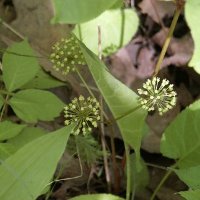
Sarsaparilla Smilax is a genus that grows in Jamaica, Mexico, Honduras and India, whose roots are used for medicinal purposes. Other species are also used for medicinal plants, among others officinalis, aristolochiaefolia, glabra, febrifuga, ornata, regelii and japicanga.
Sarsaparilla root is often made into drinks like tea and have a sweet spicy flavor and aroma of fresh. In about 1574, Sarsaparilla is used to treat syphilis and also used as traditional medicine to treat digestive problems, fever, arthritis, skin problems and cancer.
Chemical components contained in Sarsaparilla including a number of steroid saponins, which can cause the body to make its own steroids. Sarsaparilla also contains quercetin, an antioxidant that protects the body against damaging free radicals.
Womb
Chemical components of sarsaparilla include steroidal saponins, and minerals such as (magnesium, calcium, aluminum, chromium, iron, magnesium, selenium, and zinc).
Property
1. As antibacterial
According to a study published in PubMed in 2003 by S. Das, R. Prakash and SN Devarai, stating that Sarsaparilla can be used as a diarrhea medication.
This study was conducted to test the antimicrobial activity against S. Sarsaparilla typhimunium, E. coli and S. flexneri. The results showed that Sarsaparilla is more effective than standard anti-diarrhea medications. Sarsaparilla produces antidiarrheal effect because the antibacterial properties and may reduce the intestinal contractions.
2. To cope with Psoriasis
Psoriasis is a common skin condition associated with the life cycle of skin cells, causing a buildup of dead skin cells more quickly so the skin becomes scaly and red blotches appear on the skin that ache.
The content of saponin in Sarsaparilla may produce endotoxins which have binding properties of the toxin. Sarsaparilla has been used in the wider society to treat other skin conditions such as rashes, eczema and wounds.
3. Anti-inflammatory (anti-swelling)
Anti-inflammatory properties of Sarsaparilla make it useful in treating conditions such as arthritis, gout and rheumatism.
4. To help regulate hormone regulation
Sarsaparilla is believed to be a rich source of testosterone due to the effects of steroid saponins contained in it.
5. To improve memory
Scientists from the Medical University in China published a study on “Brain Research” in October 2005 showed that Sarsasapogenin given orally (by mouth) in mice can enhance learning and memory in the cortex, hippocampus and striatum of rat brain .
Although, human studies have not been performed on Sarsaparilla function as memory enhancers, but herbal tea is believed to function improve concentration and memory.







Post a Comment 0 comments: